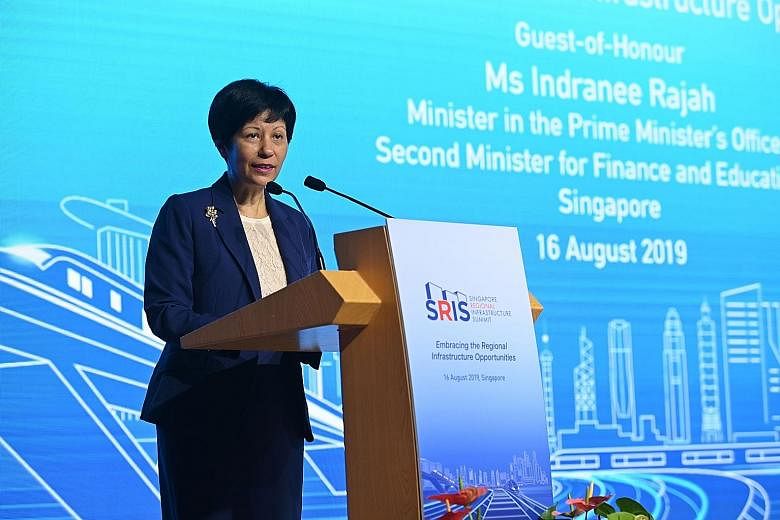The current rate of public sector financing for infrastructure projects is unsustainable for Asia's significant and growing infrastructure needs, Minister in the Prime Minister's Office Indranee Rajah said yesterday.
Government financing accounts for 90 per cent of infrastructure expenditure in Asia, compared with 70 per cent in emerging markets and 40 per cent worldwide, she noted.
"This rate of government financing is unsustainable and governments are looking at crowdsourcing private sector investments to help fill in the gap," Ms Indranee said at the Singapore Regional Infrastructure Summit (SRIS), where she was the guest of honour.
However, there are challenges in closing this gap, such as geopolitical tensions, concerns over environmental impact and investors' fears that the risks of infrastructure financing are not worth the returns.
In her speech, Ms Indranee, who is also Second Minister for Finance and Education, identified several steps that can be taken to overcome these challenges, and encourage infrastructure financing and development - a key concern, given Asia's growing population and needs.
According to reports by the Asian Development Bank (ADB), Asia will need to invest about US$26 trillion (S$36 trillion) in infrastructure by 2030 to meet the needs of the region's growing population.
This means a yearly investment of US$1.7 trillion, more than twice the US$881 billion currently spent in the region.
"A marriage between public sector project needs and private sector capabilities and expertise is required," Ms Indranee said.
Governments "need to build up capabilities and work with the private sector in order to generate a pipeline of investment-ready projects", she said, adding that multilateral development banks have set up facilities to provide financial assistance for this pipeline.
Ms Indranee cited the case of Bangladesh, where - with the support of the ADB's Urban Governance and Infrastructure Improvement Project, as well as municipal representatives - more than 580km of improved roads, 260km of improved drainage systems and upgraded sanitation facilities have been financed.
This has enabled people to move from slums to housing complexes with electricity and water.
Identifying legal reforms is also necessary to foster a conducive environment for development and investment, as stakeholders and financiers need assurance about the risks they undertake, she said.
Infrastructure financing and development must also be fiscally and environmentally sustainable, in order to address investors' growing demand for green financing options to help combat climate change, she added.
These steps would give investors "better clarity of the bankability of the projects".
Ms Indranee said that most of the challenges facing project finance are short term, but there are long-term benefits to be reaped.
"It will be difficult in the initial stage, but once the complex projects take off, more players will have confidence to invest in longer-term opportunities," she said.
The inaugural SRIS was organised by the Singapore Business Federation (SBF) and held at The Ritz-Carlton, Millenia Singapore.
In his address, SBF chairman Teo Siong Seng said: "Through this new platform, we hope to help position Singapore as Asia's infrastructure hub, and bring together regional players in the infrastructure space to discuss opportunities in this region."


